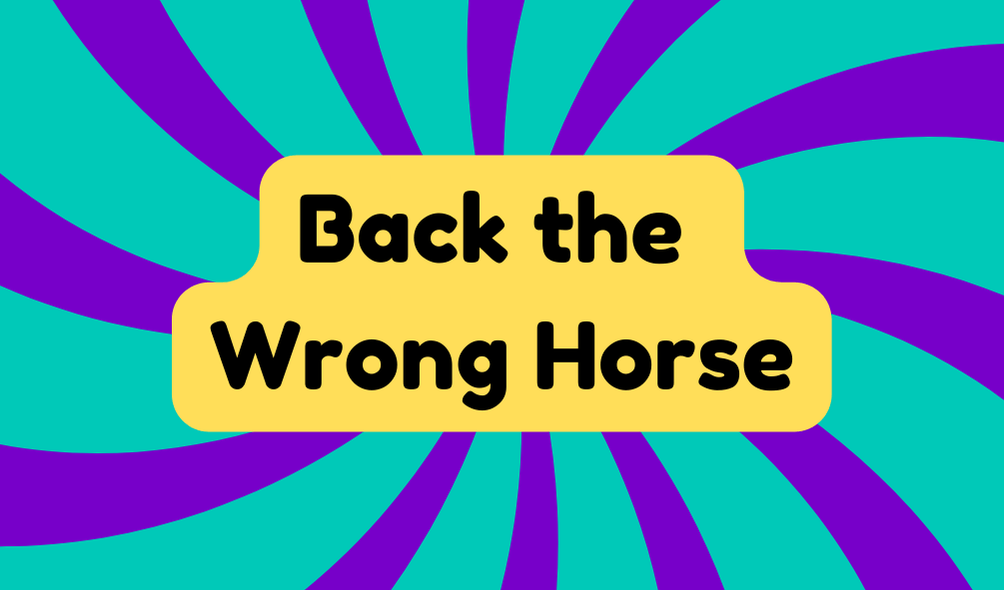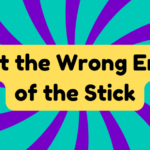"Back the wrong horse" is an idiom that signifies making poor decisions or investments. It often leads to regrettable outcomes, as individuals fail to assess risks properly. The phrase originated from horse racing in the late 1600s, capturing the challenges of choosing wisely. This expression serves as a metaphor for misguided support in various contexts, including finances and personal relationships. Many still find themselves committing to losing ventures despite available information. Understanding the implications of this phrase can improve decision-making strategies and reduce risks. To grasp its broader relevance, there's more to the story worth exploring.
Synonyms
When considering synonyms for the phrase "back the wrong horse," several expressions encapsulate similar meanings, emphasizing poor judgment in decision-making. These alternatives effectively highlight the risks associated with incorrect choices and poor decisions. Each synonym invites critical reflection on the consequences of decisions made without due diligence.
- "Bet on the wrong horse" suggests misguided investments.
- "Support a failing venture" emphasizes the commitment made to a project with low prospects.
- "Root for the underdog" can imply misguided optimism in uncertain situations.
Understanding these synonyms helps illuminate the broader implications of decision-making and the importance of strategic foresight. Recognizing these expressions can better equip individuals to navigate potential pitfalls in various contexts.
Example of Sentences
Although many entrepreneurs aspire to succeed, backing the wrong horse can lead to significant financial setbacks and missed opportunities. This concept underscores the significance of making informed choices to avoid decision pitfalls. Here are some example sentences illustrating the impact of poor choices:
- Expert stock traders rarely back the wrong horse.
- Marrying an unsuitable partner can be considered betting on the wrong horse.
- Recognition of backing the wrong horse sometimes comes too late.
These instances reflect how backing the wrong horse can permeate various life facets. In the competitive landscape of innovation and business, understanding these examples is crucial for avoiding detrimental decision-making. Careful evaluation of potential risks is essential to minimize the chances of encountering the repercussions of wrong choices.
Origin
The term "back the wrong horse" can be traced back to the late 1600s, coinciding with the burgeoning popularity of horse racing in England. During this era, enthusiastic punters engaged in decision-making by placing bets on horses they predicted would win. This phrase emerged as a metaphorical caution, illustrating the pitfalls of poor judgment in selecting support for a venture. By the 17th and 18th centuries, it became more widely recognized in literature, significantly in Richard Brinsley Sheridan's play "The Rivals" (1775). The inherent risk in backing the losing side serves as a timeless reminder about the complexities of decision-making, emphasizing the need for critical analysis and foresight in any strategic pursuit.
Collocations
Understanding collocations related to the phrase "back the wrong horse" can enhance comprehension of its nuanced meaning in various contexts. By recognizing phrases related to this expression, one can better navigate situations involving misguided support or decision-making. Some notable collocations regarding this phrase include:
- "bet on the wrong horse," indicating a poor choice.
- "back on the wrong horse," implying continued support for a failing option.
- "make a wrong bet," highlighting the consequences of faulty predictions.
Realistically, an awareness of these collocations fosters a critical perspective on choices, urging individuals to reflect upon the risks associated with their decisions. In an era of rapid innovation, understanding the implications of these phrases can lead to more informed and strategic outcomes.
How to Use in Everyday Language
Recognizing collocations can greatly aid in utilizing expressions like "back the wrong horse" in everyday language. This idiom can reflect our modern decision-making processes, whether in personal relationships or professional endeavors. Understanding how to apply it can improve your communication and help you avoid similar pitfalls.
| Context | Example | Modern Application |
|---|---|---|
| Personal Relationships | Marrying an unsuitable partner | Choosing better partners |
| Business Decisions | Investing in failing companies | Making smarter investments |
| Career Choices | Following a poor job lead | Selecting suitable opportunities |
| Sports Predictions | Betting on losing teams | Enhancing predictive accuracy |
Using these everyday examples, individuals can navigate their choices more wisely, ultimately avoiding the regret of backing the wrong horse.
Why Is It Still Relevant Today?
Although society has evolved considerably since the idiom originated, "back the wrong horse" remains relevant as it encapsulates the universal human experience of making poor choices. In today's fast-paced world, modern decision making requires careful risk assessment, yet numerous individuals and organizations continue to misjudge their options. As innovations unfold, the temptation to support seemingly promising ventures increases, often blurring critical judgment. This phenomenon can lead to regrettable miscalculations, as investors, entrepreneurs, and even everyday people may find themselves entrenched in the wrong pursuits. Recognizing the potential pitfalls of backing the wrong horse encourages a more discerning approach to decision making, fostering a culture that values informed choices and effectively mitigates the risks associated with misguided support.






